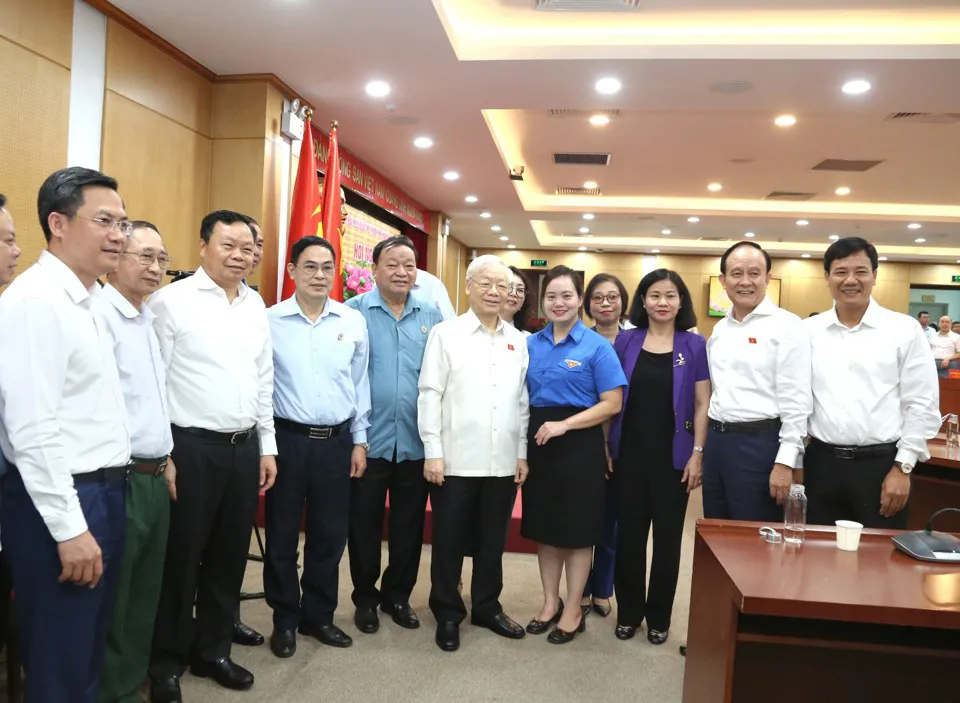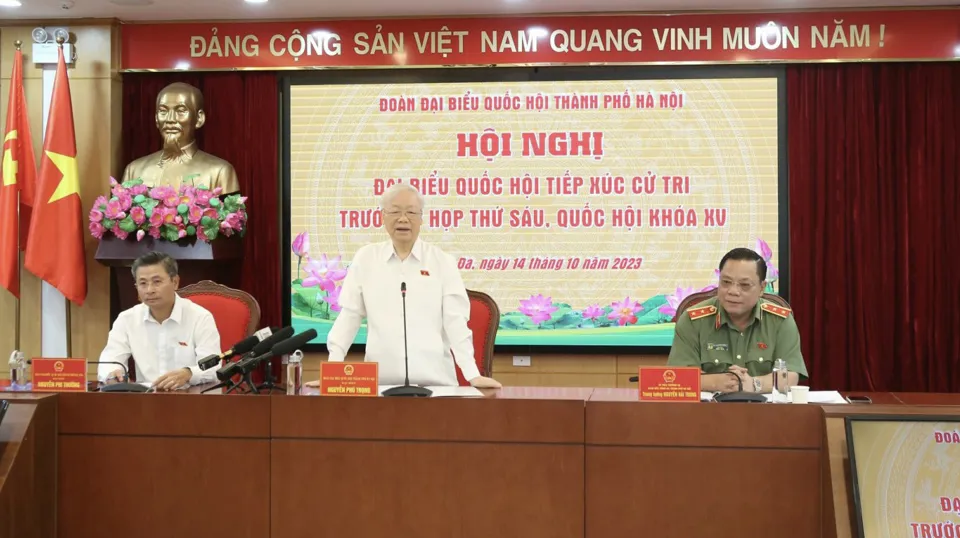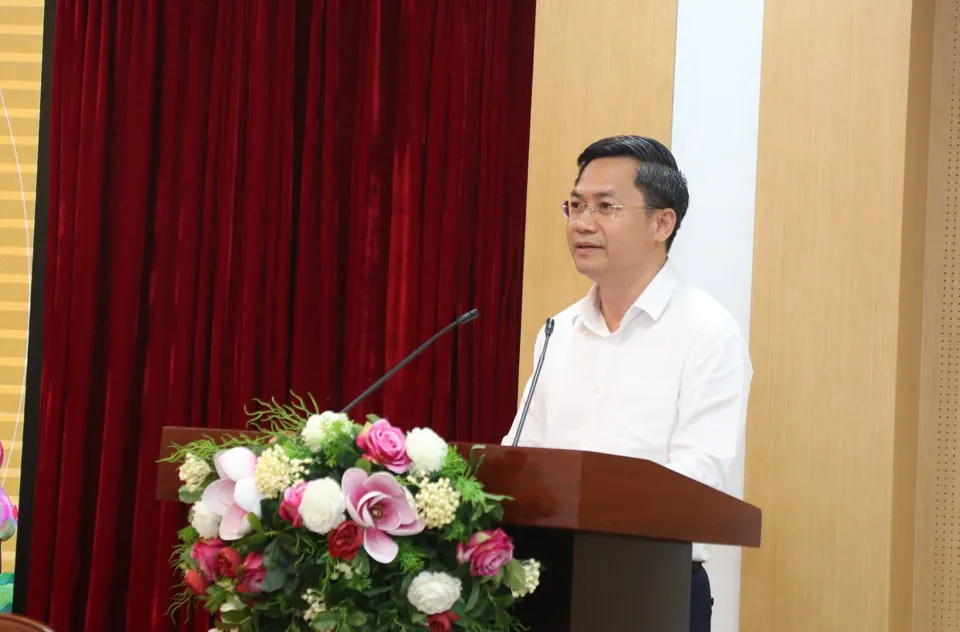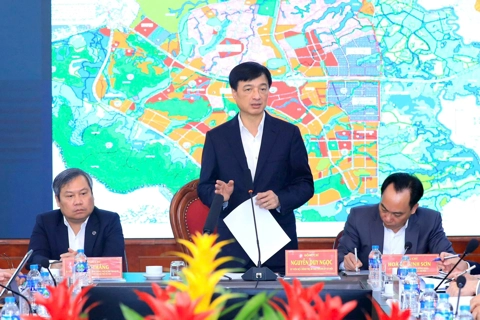Vietnam’s bamboo diplomacy characterized by both adaptability and strength: Pary Chief
Through such diplomatic initiatives, Vietnam's standing in the global arena is progressively strengthening.
Vietnam's present standing is the result of its "bamboo diplomacy" approach, which is characterized by both flexibility and strength, General Secretary of the Communist Party of Vietnam Nguyen Phu Trong said at a meeting between deputies of the National Assembly delegation of Hanoi and local voters today [October 14], ahead of the upcoming 6th National Assembly session.
| Party Chief Nguyen Phu Trong and deputies of the National Assembly delegation of Hanoi. Photos: Thanh Hai/The Hanoi Times |
Trong's mentions came in reply to a question posed by voter Phung Huy Dan from Dong Da District. The question referred to the state visit of US President Joe Biden to Vietnam at the invitation of the Party Chief himself and the subsequent elevation of bilateral relations to a Comprehensive Strategic Partnership.
He underlined that through such diplomatic initiatives, Vietnam's standing in the global arena is progressively strengthened.
"The fact that the US has reaffirmed its support for a robust, sovereign, self-reliant, and prosperous Vietnam shows the enhanced role and prestige of the Communist Party of Vietnam and the country on the international stage," said Trong.
| Vietnam Party Chief Nguyen Phu Trong speaks at the meeting. |
"Our country has never had such potential, position, and international prestige it enjoys today," he reiterated, reaffirming the "Vietnamese bamboo" foreign policy that is both adaptable and resilient.
This policy, he said, is deeply rooted in the foreign policy principles of the country's forebears, particularly the instructions of President Ho Chi Minh.
Trong also highlighted the roles and functions of various components within the political system, clinging to the principle that "The Party leads, the State rules, and the people are the masters."
He stressed the importance of these actors fulfilling their responsibilities as prescribed by regulations, avoiding situations of overestimating their power, similar to "crabs relying on their pincers" and "every person thinking their authority is paramount."
He said National Assembly deputies should avoid superficiality and actively listen to the people's views when dealing with constituents. Voters and citizens play a key role in oversight and inspection activities. "Therefore, before and after each meeting, delegates must communicate with voters, seek their feedback, and report the meeting outcomes".
Constituents raise social issues
During the discussions with National Assembly deputies, voters gave feedback on various legislative projects, including the amended 2013 Land Law Project and the amended Capital Law Project.
| Voter Phung Huy Dan from Dong Da District. |
Voter Phung Huy Dan from Dong Da District stressed that the Land Law Bill had been thoroughly reviewed and had received input from various agencies and organizations. Consequently, he urged the National Assembly deputies to carefully study and deliberate the bill before passing it.
Regarding the amended Capital Law Project, Dan recommended that the law incorporate consistent and appropriate environmental protection regulations, particularly regarding waste collection, transportation, and disposal.
On the other hand, voter Nguyen Kim Son from Ba Dinh District emphasized that the amended Capital Law Project is up for discussion during the upcoming 6th Session of the National Assembly to establish a solid legal foundation and distinctive mechanisms to enable Hanoi to develop in line with its role as the nation's political and administrative center.
Son believed that public awareness and engagement in the development of this law should be further encouraged to refine the legislation.
| Voter Nguyen Kim Son. |
Furthermore, he hoped that National Assembly deputies would pay close attention to the planning and construction program for nine urban railway lines in Hanoi, as outlined in the approved 318km plan for 2030 to 2050.
Son also urged the resolution of long-stalled projects that have marred the city's aesthetics and caused significant economic and land waste.
Voter Nguyen Thanh Binh from Hai Ba Trung District urged the National Assembly to continue focusing on back-and-forth discussions aimed at bolstering comprehensive, synchronized solutions to push economic and social development during the 6th session.
"This approach would help uphold economic growth, price stability, and people's well-being while improving social security, promoting sustainable poverty reduction, and creating a conducive environment for business recovery and growth," Binh said.
He also suggested enhancing the quality of the National Assembly's oversight activities, with a particular focus on the effective preparation and implementation of urban planning, addressing environmental pollution, waste management, and fire prevention in major cities.
On the topic of digital transformation, voter Nguyen Thi Thanh Phuong from Ba Dinh District noted that the rapid development of technology and the Internet has brought about significant changes in community awareness and behavior. However, there remain shortcomings in social network information management that need to be addressed. Phuong called on National Assembly deputies to make recommendations to remedy these limitations promptly.
Additionally, voters raised concerns about the policy of relocating ministries and agencies' headquarters from downtown Hanoi, challenges related to the merging of commune-level administrative units, and the ongoing fight against corruption and negative practices.
| Vice Chairman of the Hanoi People's Committee Ha Minh Hai. |
They also spotlighted the issue of vacant land, unexecuted planning, which has resulted in waste, and the importance of decentralization to foster development in the capital area.
At the meeting, Vice Chairman of the Hanoi People's Committee Ha Minh Hai pledged all voter feedback would be taken seriously.
Hai said the city's leaders will continue to guide relevant departments and agencies to collaborate closely with central ministries and branches to amend, supplement, and enhance mechanisms and policies promptly.
"This approach aims to serve as a catalyst for the socio-economic development in the capital area in 2023 and to design a socio-economic development plan for 2024 and beyond," he said.





.jpg)










